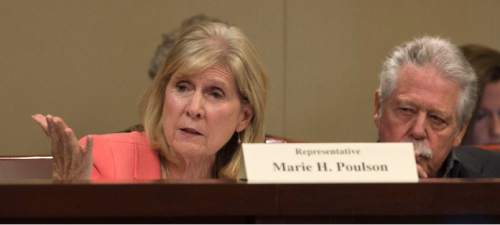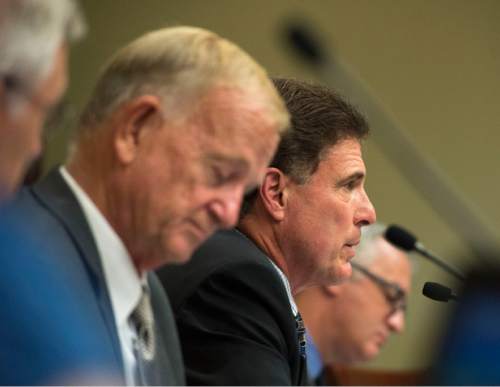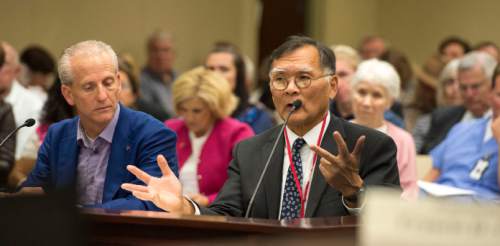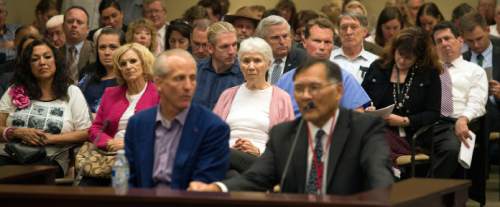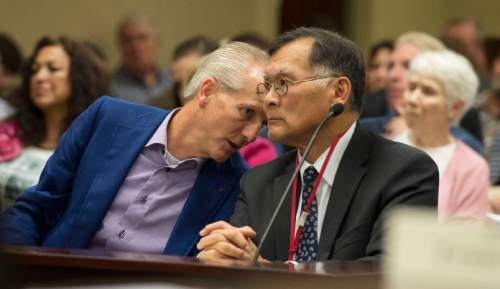This is an archived article that was published on sltrib.com in 2015, and information in the article may be outdated. It is provided only for personal research purposes and may not be reprinted.
Doctors, hospitals and other medical providers are working hard behind the scenes to scuttle a proposal to levy $50 million in taxes and fees on health care providers in order to expand coverage to low-income Utahns. And they are making their pitch to a decidedly friendly audience.
According to legislative conflict-of-interest disclosures, 21 House members and 14 senators have varying levels of connections to the medical field, many belonging to the same groups now lobbying hard against the Medicaid-expansion proposal, branded as Utah Access Plus.
Seven legislators are doctors and two are past presidents of the Utah Medical Association, the group most vocally opposed to Utah Access Plus. Three other lawmakers are married to doctors.
Three members of the body are administrators or staff for Intermountain Healthcare, the largest medical provider in the Intermountain West, which is opposing the new proposal. Rep. Craig Hall, R-West Valley City, for example, is an attorney for Intermountain Healthcare.
Sen. Stuart Adams, R-Layton, is a part owner of two hospitals in Roy and Davis County; Sen. Jerry Stevenson, R-Layton, is a stockholder in the Davis hospital; and numerous others, including House Speaker Greg Hughes, R-Draper, are on the local boards of hospitals.
House Majority Leader Jim Dunnigan, R-Taylorsville, one of the primary architects of the legislation, owns an insurance agency. The state's insurance group is opposed to the measure.
"From my end of it, I think my insurance background has been a definite plus," Dunnigan said. "That's my perspective. Others may disagree."
While he could see some financial benefit from those currently uninsured buying new insurance policies, he said it would be small and has never driven his decision. If it had, he said, he wouldn't have opposed Gov. Gary Herbert's Healthy Utah plan for Medicaid expansion last session.
Rob DeBirk, executive director of the Alliance for a Better Utah, a progressive advocacy group, said while the lawmakers with conflicts fall on different sides of the issue, it's reasonable to scrutinize the legislators' connections.
"When an issue as important as this one is being debated, Utahns need to be even more vigilant when it comes to investigating potential conflicts of interest," he said. "When 80 percent or more of the population are in favor of seeing a policy passed and you have this many legislators with conflicts of interest and the policy doesn't pass, rightly or wrongly, Utahns are going to sit back and say, 'I wonder if this played a part in it.' "
The ties to the health industry are especially true on the Health Reform Task Force, which held the first public hearing on the Utah Access Plus plan last week. Ten of the 11 members on the panel have some tie to the health care field, a fact Dunnigan says has been valuable to the process.
"One of the reasons people are on the task force is their expertise. It's wonderful to have a physician's perspective on the task force. This issue and other health-reform issues are complicated, and it's wonderful when people understand it," he said. "I guess you could put people on there who don't have a clue on very complicated issues and they'd have to spend a couple of years just getting up to speed."
There is clearly no cut-and-dry correlation between a legislator's support or opposition to Medicaid expansion and the views of his or her employer.
For example, during the legislative session earlier this year, Intermountain Healthcare supported Herbert's Healthy Utah plan.
But employees such as House Majority Whip Francis Gibson, R-Mapleton, who is the process improvement director for Intermountain Healthcare, and Rep. Dean Sanpei, R-Provo, who is vice president of planning for Intermountain, were outspoken opponents of the measure.
Likewise, Rep. Norm Thurston, R-Provo, who is the director of statistics for the Utah Department of Health, opposed Healthy Utah, a plan that directors of the department were instrumental in crafting.
Indeed, when Healthy Utah came up for a vote earlier this year, just 10 Republican members voted for Herbert's proposal, despite backing from the Utah Medical Association, the Utah Hospital Association, Intermountain Healthcare and others.
This time, Intermountain and the Utah Hospital Association have changed course. While they support expanding Medicaid to cover low-income Utahns, the hospitals oppose having to pay an estimated $23.5 million of the bill, especially when there are no guarantees that enrollments won't skyrocket and drive costs astronomically higher than projected.
Sen. Brian Shiozawa, R-Cottonwood Heights, is another member of the Gang of Six that negotiated the Utah Access Plus bill. An emergency room physician, he is also part of a group that is building a new, stand-alone emergency room in Taylorsville and acknowledges that he could benefit from treating fewer uninsured patients.
"I have to be careful that that's not the primary driver, and it's not," he said. "I've done this for years. Decades in fact. If it doesn't pass, I'll feel bad for the patients, but I'll survive."
House Republicans are scheduled to meet Tuesday behind closed doors to determine if there is enough support to warrant a special session later this month. Hughes has insisted all 38 votes to pass Utah Access Plus come from the Republican caucus, without consideration of the 11 votes of House Democrats.
Shiozawa said the speaker's decision to insist on overwhelming GOP support caught him by surprise.
"It breaks my heart. Six months of work on that, and it [may] not even come out of the House caucus for a vote?" he said. "The problem is not going away. These people don't just disappear. If anything, the problem just gets worse because more and more patients find themselves in this situation and their health gets worse and there will be sicker patients and there will be some patients dying. There are some very real costs."


